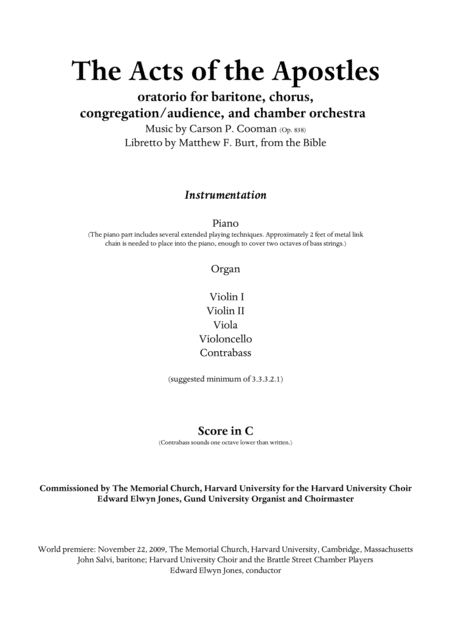Chamber Orchestra - Level 5 - Digital Download SKU: A0.533578 Composed by Carson Cooman. Christian,Contemporary,Spiritual. Score and parts. 189 pages. Musik Fabrik Music Publishing #3025409. Published by Musik Fabrik Music Publishing (A0.533578). The Acts of the Apostles (2009), an oratorio for baritone, chorus, congregation/audience, and chamber orchestra (piano, organ, strings-suggested minimum of 3.3.3.2.1),was commissioned by The Memorial Church at Harvard University. It is dedicated to Edward Elwyn Jones and theHarvard University Choir.The biblical books of Luke and Acts form a pair of documents from a single author and with a single audience (thelikely-metaphorical “Theophilus”), yet they are unusual for being composed in such contrasting genres. Luke’sgospel, using Mark as a primary source throughout, features a comparable literary style to that of the otherevangelists. Acts, by contrast, is a historical monograph that charts the birth of the Church with dramatic storiesabout—and speeches from—the apostles, painting a vivid, if not necessarily chronological, picture of their victoriesand struggles. As such, it is a book that provides excellent source material for a dramatic choral libretto of this scale.Although much of Acts is focused on the ministry of Saul/Paul, this oratorio draws most of its material from thefirst third of the book, prior to and including the conversion of Saul. In the Prologue, Christ’s ascension is narratedand—following an orchestral Sinfonia—the chorus sings words of Jesus from the Sermon on the Plain in Luke’sgospel that foreshadow many of the trials the apostles go on to face. The astounding account of Pentecost follows:here, words from the book of Ruth, customarily read on the feast of Shavuot (Pentecost), are included, telling thestory of a Moabite woman who converted to the Israelite faith—a parallel to the expansion of the Christian messageto all nations by the gift of the Holy Spirit. The Prayer for Boldness, quoting Psalm 2, asks God for protection fromthe threats of persecution that the apostles will now face.Stephen, regarded as the proto-martyr of the Christian Church, offers one of the most developed speeches in Acts,only a small portion of which is presented here. Full of scriptural references, including the quotation from Isaiah“Heaven is my throne…”, the end of the narrative is remarkable for two reasons: firstly, Stephen’s final wordsmirror those of Christ on the cross in Luke’s gospel—where Jesus forgives his executioners and prays “Father, intoyour hands I commend my spirit” (Luke 23:46); secondly, Saul is specifically mentioned as one who approved ofStephen’s stoning, indicative of the redemptive possibilities of the Christian message.The account of the baptism of the Ethiopian eunuch here in the oratorio ends with the First Song of Isaiah—whilenot quoted in Acts, it seems a fitting conclusion to the scene as Philip and the eunuch were reading Isaiah together,and the canticle has often been associated by Christians with the rite of baptism. Similarly, the story of Saul’sConversion is followed here by a Christological poem found in Paul’s letter to the Philippians, though it is likely aquotation from an earlier source. It is often regarded as the earliest extant Christian hymn.The Acts of the Apostles concludes with Luke’s realistic assessment that in spite of Paul’s energetic evangelism manyremained unconvinced by the Christian message. At the heart of both Luke’s gospel and Acts is the tension betweenthe uniquely important role of the Jewish traditions that Jesus himself practiced and the expansion of the gospel togentiles, of whom Luke himself is one. It is appropriate, therefore, to follow Paul’s message of salvation to thegentiles with the Magnificat: a canticle that emphasizes the promises of God to the people of Israel throughouthistory.Three traditional hymn texts are found in the oratorio, each set congregationally to a pre-existing tune. The first,“Spirit of mercy, truth, and love” is an eighteenth century poem that e.
